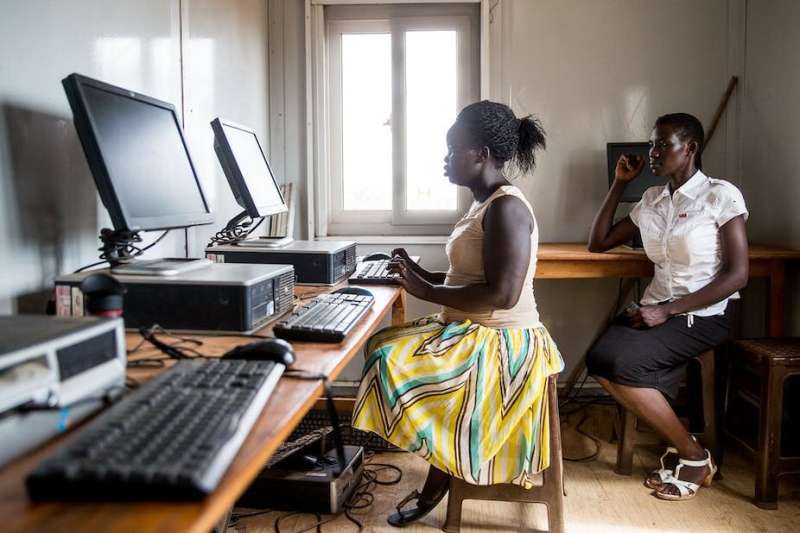Digital activism: Study shows the internet has helped women in urban Ghana and Nigeria raise their voices

Information technology and the internet have proven to be a strong force for building collective action groups and mobilizing communities of protesters. Among the main advantages of digital and online activism are its increasing accessibility (relatively low-cost and easy to use), its speed, and the ability to reach large numbers of people around the world.
Digital activists can protest and advance their cause using a variety of digital tools. They include websites for online petitions (such as Change.org and Avaaz.org), social networks (Facebook, YouTube, Myspace), blogs (as a form of citizen journalism), micro-blogging (Twitter), mobile phones and proxy servers.
These digital platforms can connect with a large community and at both local and international levels. The interconnected nature of social media platforms such as Twitter and Facebook makes it easy to share information. Activists can post messages, slogans, photos and instructions more easily than using the traditional street protests or door-to-door mobilization strategies.
The drawback of digital campaigning, however, is that the same tools can be used for hate speech and misinformation. This has sometimes endangered the goals of such campaigns.
Women's rights groups in Nigeria and Ghana are among social movements that have these tools at their disposal. Groups like Female in Nigeria and Network for Women's Rights in Ghana seek to empower women economically and politically. They also advocate for women's rights to education, respect, social justice and inclusion in political leadership. They protest against violence and victimization and call attention to inequalities.
As a scholar of social media and society, I carried out a study to investigate women advocacy action groups in Nigeria and Ghana and how digital communication may have enhanced or limited their actions and objectives.
My findings show that social media give women advocacy groups a voice, allowing them to speak more freely in a context of traditional patriarchy. This shows the importance of technology in shaping social life. Women in these countries are demanding change—and change is happening. But the groups' reach is limited mostly to urban areas because access to the internet is constrained in rural areas.
A safe space
For my study, I drew on the websites of women advocacy groups in Nigeria and Ghana and posts on their social media platforms. I used computer-mediated discourse analysis, a method of analyzing online interactions and their implications for society. The analysis considers information about the people interacting online, their relationship with one another, their purposes for communicating, what they are communicating about and the kind of language they use.
The groups I looked at were the Nigerian Women Trust Fund, Nigerian League of Women Voters, Kudirat Initiative for Democracy (KIND), Gender Center For Empowering Development and Network for Women's Rights in Ghana.
These groups have been very active for some time. They target public audiences, including the government and other interest groups.
My focus was on campaigns for political empowerment rather than access to economic and material resources.
These groups' websites were notably non-confrontational in style. They promoted group activities, created public awareness, and sought feedback and involvement. Mostly the language was used to inform, report and claim, and to describe events and processes. Sometimes it was used to give direction, such as appealing for and inviting certain actions.
English was the language used for most of the website content.
The groups were not only active via their websites but also on their social media platforms, particularly Twitter and Facebook. Campaign messages on these platforms were different from those on the websites. They celebrated successful female politicians and expressed resistance and hope. They showed solidarity with inspiring women parliamentarians and other role models, and mobilized support for women running for political office.
Messages on social media called for members to participate in rallies and offline protests, demand change and reject the marginalization and victimization of female politicians.
The messages did not explicitly challenge male authority, but asked for a fair chance for women to decide on issues that affect their lives.
Other campaign messages were about group activities such as webinars and training for women aspiring to political office.
The language used tended to be encouraging towards women, and not hostile to men.
Room for improvement
With the backing of the United Nations and the African Union, women in African countries are achieving progress. Rwanda, for example, has the world's highest level of female representation in government, at 61%.
The number of women in government in sub-Saharan Africa grew to a regional average of 23.7% in 2018. In Ghana, 14% of seats in parliament are held by women after the election in 2020. In Nigeria, the House of Representatives has 18 female members (5%) out of 360 while the Senate has eight women (7%) out of 109 members.
Further progress will depend in part on the challenges that online activism faces. These problems are not particularly related to the content and character of online communication, but rather to access to technology. Urban women have an advantage over women in rural areas because of their access to the internet.
In Ghana and Nigeria, the internet doesn't reach rural areas due to perceived low revenues and steep investment cost. Technology companies don't invest where the population is small or sparsely distributed.
So it is difficult for people in rural areas to access online-based advocacy forums and training.
While online activism of the women's empowerment advocates is effective, it is limited to a small percentage of the population. Women are still grossly underrepresented in Nigeria and Ghana.
Provided by The Conversation
This article is republished from The Conversation under a Creative Commons license. Read the original article.![]()




















